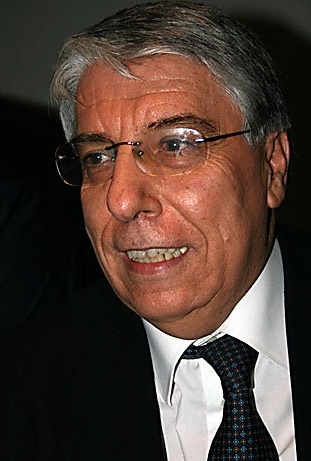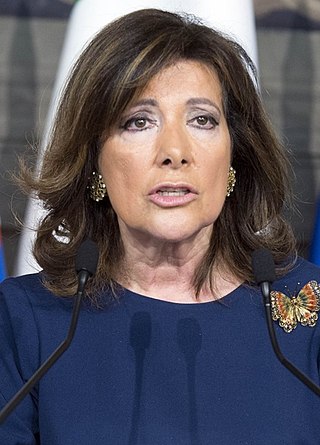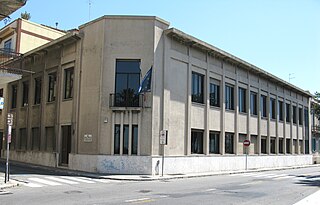Revelations about Gladio and activities as a writer
In 1997, a website titled "The Real History of Gladio" [3] was published and began a campaign of disclosure of the documents about the Gladio Organization which had remained in his possession in response to an attack on his life that declared to the press to have suffered in February 1993. On July 26, 1998, shall issue an interview in New York with journalist Stefano Vaccara in America Oggi , an Italian-language newspaper distributed in the U.S. [4] The interview, published in two parts about nine pages, contains revelations on the structure of the Gladio Organization and shows in the light of operational experience of gladiator Arconte, known by the code name G-71, an overview of many obscure, Italian and international episodes during the cold war. The revelations note the involvement of the military prosecutor and civil of Rome that opens the judicial proceedings against Arconte, from which he will be acquitted and part offended by "unknown". At the same time, is interested in the case the national and international press and revelations become the object of parliamentary question. [5] In December 2001, he published his autobiography "L'Ultima Missione - The Last Mission. G-71 and the truth denied", which summarizes the revelations and the judicial cases connected and illustrates the operations from secret agent to which the Arconte claims and documents to have participated.

Francesco Maurizio Cossiga was an Italian politician. A member of Christian Democracy, he was prime minister of Italy from 1979 to 1980 and the president of Italy from 1985 to 1992. Cossiga is widely considered one of the most prominent and influential politicians of the First Italian Republic.

Amintore Fanfani was an Italian politician and statesman, who served as 32nd prime minister of Italy for five separate terms. He was one of the best-known Italian politicians after the Second World War and a historical figure of the left-wing faction of Christian Democracy. He is also considered one of the founders of the modern Italian centre-left.

Fernando Tambroni Armaroli was an Italian politician. A member of Christian Democracy, he served as the 36th Prime Minister of Italy from March to July 1960. He also served as Minister of the Interior from July 1955 until February 1959, Minister of Budget and Treasury from February 1959 to March 1960, and Minister of the Merchant Navy from August 1953 until July 1955.

Giulio Andreotti was an Italian politician and statesman who served as the 41st prime minister of Italy in seven governments, and was leader of the Christian Democracy party and its right-wing; he was the sixth-longest-serving prime minister since the Italian unification and the second-longest-serving post-war prime minister. Andreotti is widely considered the most powerful and prominent politician of the First Republic.
Operation Gladio was the codename for clandestine "stay-behind" operations of armed resistance that were organized by the Western Union (WU), and subsequently by NATO and by the CIA, in collaboration with several European intelligence agencies during the Cold War. Although Gladio specifically refers to the Italian branch of the NATO stay-behind organizations, Operation Gladio is used as an informal name for all of them. Stay-behind operations were prepared in many NATO member countries, and in some neutral countries.

Italy has recognised same-sex civil unions since 5 June 2016, providing same-sex couples with all of the legal protections enjoyed by opposite-sex married couples, excluding joint adoption rights. A bill to allow such unions, as well as gender-neutral registered partnerships, was approved by the Senate on 25 February 2016 and the Chamber of Deputies on 11 May and signed into law by the Italian President on 20 May of the same year. The law was published in the official gazette the next day and took effect on 5 June 2016. Before this, several regions had supported a national law on civil unions and some municipalities passed laws providing for civil unions, though the rights conferred by these civil unions varied from place to place.

In Italy, the phrase Years of Lead refers to a period of political violence and social upheaval that lasted from the late 1960s until the late 1980s, marked by a wave of both far-left and far-right incidents of political terrorism and violent clashes.

Carlo Amedeo Giovanardi is an Italian politician. He is a former member of the Senate of the Republic and leader of the socially conservative wing of the New Centre-Right party.

Maria Elisabetta Alberti, known by her married name as Maria Elisabetta Alberti Casellati, is an Italian lawyer and politician, serving as Minister fo Institutional Reforms since 2022. She was President of the Italian Senate from 2018 to 2022. She was the first woman ever to have held this position. Casellati is a long-time member of the liberal-conservative party Forza Italia and served as Undersecretary of Health and Justice in previous governments. In 2022, she was nominated as candidate for President of Italy by the centre-right coalition.

The Legislature IV of Italy was the 4th legislature of the Italian Republic, and lasted from 16 May 1963 until 4 June 1968. Its composition was the one resulting from the general election of 28 April 1963.

The kidnapping and murder of Aldo Moro, also referred to in Italy as the Moro case, was a seminal event in Italian political history. On the morning of 16 March 1978, the day on which a new cabinet led by Giulio Andreotti was to have undergone a confidence vote in the Italian Parliament, the car of Aldo Moro, former prime minister and then president of the Christian Democracy party, was assaulted by a group of far-left terrorists known as the Red Brigades in via Fani in Rome. Firing automatic weapons, the terrorists killed Moro's bodyguards — two Carabinieri in Moro's car and three policemen in the following car — and kidnapped him. The events remain a national trauma. Ezio Mauro of La Repubblica described the events as Italy's 9/11. While Italy was not the sole European country to experience extremist terrorism, which also occurred in France, Germany, Ireland, and Spain, the murder of Moro was the apogee of Italy's Years of Lead.

Sergio Flamigni is an Italian politician and writer. A member of the Italian Communist Party (PCI), he took part in the Italian Parliament's investigative commissions on the murder of Aldo Moro, the Propaganda Due scandal, and on the Italian Mafia.

The Stazione Sperimentale per le Industrie delle Essenze e dei Derivati dagli Agrumi (SSEA) is a special Agency of the Chamber of Commerce in Reggio Calabria.

Marino Curnis is an Italian writer, poet, musician, language student and traveller. He is known mainly because of his travel on foot from Bergamo, Italy, to Iran. His trip was called Eurasia Pedibus Calcantibus. It covered 6.000 kilometres over 13 months.

Pietro Ichino is an Italian politician and professor of labor law at the University of Milan. From 1979 to 1983, he was an independent left-wing MP belonging to the ranks of the Italian Communist Party. In 2008, he was elected senator for the Democratic Party in the district of Lombardy.

Italian Left is a left-wing political party in Italy. SI was launched in November 2015 as a parliamentary group in the Chamber of Deputies, including Left Ecology Freedom (SEL), dissidents from the Democratic Party like Future to the Left, and splinters from the Five Star Movement. At its launch, SI included 32 deputies, who were soon followed by 8 senators, and 2 MEPs. SI was officially formed as a full-fledged party in February 2017, after SEL had chosen to merge into it in December 2016.
The National Institute for the Honour Guard of the Royal Tombs of the Pantheon is an Italian paramilitary company, originally chartered by the House of Savoy and subsequently operating with authorization of the Italian Republic, which mounts guards of honor at the royal tombs of the Roman Pantheon.

The 2020 Italian by-elections were called to fill seats in the Parliament that became vacant after the 2018 general elections. In 2020, by-elections were held for the Chamber of Deputies the Senate of the Republic.

Giuseppe Mangialavori is an Italian politician. He is a senator of the Republic of Italy and a member of the Legislature XVIII of Italy. He has been Regional Coordinator of Forza Italia in Calabria since March 2021.
In May 1978, Aldo Moro, a Christian Democracy (DC) statesman who advocated for a Historic Compromise with the Italian Communist Party, (PCI), was murdered after 55 days of captivity by the Red Brigades (BR), a far-left terrorist organization. Although the courts established that the BR had acted alone, conspiracy theories related to the Moro case persist. Much of the conspiracy theories allege additional involvement, from the Italian government itself, its secret services being involved with the BR, and the Propaganda Due (P2) to the CIA and Henry Kissinger, and Mossad and the KGB.















